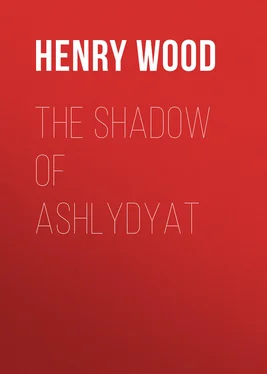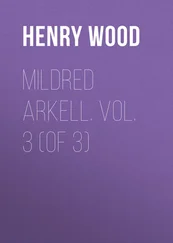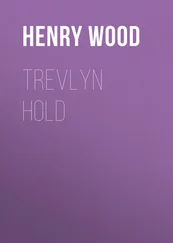Henry Wood - The Shadow of Ashlydyat
Здесь есть возможность читать онлайн «Henry Wood - The Shadow of Ashlydyat» — ознакомительный отрывок электронной книги совершенно бесплатно, а после прочтения отрывка купить полную версию. В некоторых случаях можно слушать аудио, скачать через торрент в формате fb2 и присутствует краткое содержание. Жанр: foreign_prose, literature_19, foreign_antique, на английском языке. Описание произведения, (предисловие) а так же отзывы посетителей доступны на портале библиотеки ЛибКат.
- Название:The Shadow of Ashlydyat
- Автор:
- Жанр:
- Год:неизвестен
- ISBN:нет данных
- Рейтинг книги:4 / 5. Голосов: 1
-
Избранное:Добавить в избранное
- Отзывы:
-
Ваша оценка:
- 80
- 1
- 2
- 3
- 4
- 5
The Shadow of Ashlydyat: краткое содержание, описание и аннотация
Предлагаем к чтению аннотацию, описание, краткое содержание или предисловие (зависит от того, что написал сам автор книги «The Shadow of Ashlydyat»). Если вы не нашли необходимую информацию о книге — напишите в комментариях, мы постараемся отыскать её.
The Shadow of Ashlydyat — читать онлайн ознакомительный отрывок
Ниже представлен текст книги, разбитый по страницам. Система сохранения места последней прочитанной страницы, позволяет с удобством читать онлайн бесплатно книгу «The Shadow of Ashlydyat», без необходимости каждый раз заново искать на чём Вы остановились. Поставьте закладку, и сможете в любой момент перейти на страницу, на которой закончили чтение.
Интервал:
Закладка:
“Then I’ll fill the house with guests,” she petulantly said.
“Fill it, and welcome, if you like, Kate,” he replied. “But, to go to London, you must wait for another opportunity.”
“What a hateful thing business is! I wish it had never been invented!”
“A great many more wish the same. And have more cause to wish it than you,” he drily answered. “Is tea ready?”
Mrs. Verrall returned to the room she had left, to order it in. Charlotte Pain was then standing outside the large window, leaning against its frame, the King Charles lying quietly in her arms, and her own ears on the alert, for she thought she heard advancing footsteps; and they seemed to be stealthy ones. The thought—or, perhaps, the wish—that it might be George Godolphin, stealing up to surprise her, flashed into her mind. She bent her head, and stroked the dog, in the prettiest unconsciousness of the approaching footsteps.
A hand was laid upon her shoulder. “Charlotte!”
She cried out—a sharp, genuine cry of dismay—dropped the King Charles, and bounded into the room. The intruder followed her.
“Why, Dolf!” uttered Mrs. Verrall in much astonishment. “Is it you?”
“It is not my ghost,” replied the gentleman, holding out his hand. He was a little man, with fair hair, this Mr. Rodolf Pain, cousin to the two ladies. “Did I alarm you, Charlotte?”
“Alarm me!” she angrily rejoined. “You must have sprung from the earth.”
“I have sprung from the railway station. Where is Verrall?”
“Why have you come down so unexpectedly?” exclaimed Mrs. Verrall.
“To see Verrall. I return to-morrow.”
“Verrall goes up to-morrow night.”
“I know he does. And that is why I have come down.”
“You might have waited to see him in London,” said Charlotte, her equanimity not yet restored.
“It was necessary for me to see him before he reached London. Where shall I find him, Mrs. Verrall?”
“In the dining-room,” Mrs. Verrall replied. “What can you want with him so hurriedly?”
“Business,” laconically replied Rodolf Pain, as he left the room in search of Mr. Verrall.
It was not the only interruption. Ere two minutes had elapsed, Lady Godolphin was shown in, causing Mrs. Verrall and her sister almost as much surprise as did the last intruder. She had walked over from the Folly, attended by a footman, and some agitation peeped out through her usual courtly suavity of manner, as she asked whether Charlotte Pain could be ready to start for Scotland on the morrow, instead of on Monday.
“To-morrow will be Sunday!” returned Charlotte.
“I do not countenance Sunday travelling, if other days can be made use of,” continued Lady Godolphin. “But there are cases where it is not only necessary, but justifiable; when we are glad to feel the value of those Divine words, ‘The Sabbath was made for man, and not man for the Sabbath.’ Fever has broken out again, and I shall make use of to-morrow to escape from it. We start in the morning.”
“I shall be ready and willing to go,” replied Charlotte.
“It has appeared at Lady Sarah Grame’s,” added Lady Godolphin, “one of the most unlikely homes it might have been expected to visit. After this, none of us can feel safe. Were that fever to attack Sir George, his life, in his present reduced state, would not be worth an hour’s purchase.”
The dread of fever had been strong upon Lady Godolphin from the first; but never had it been so keen as now. Some are given to this dread in an unwonted degree: whilst an epidemic lasts (of whatever nature it may be) they live in a constant state of fear and pain. It is death they fear: being sent violently to the unknown life to come. I know of only one remedy for this: to be at peace with God: death or life are alike then. Lady Godolphin had not found it.
“Will Mr. Hastings permit his daughter to travel on a Sunday?” exclaimed Mrs. Verrall, the idea suddenly occurring to her, as Lady Godolphin was leaving.
“That is my business,” was my lady’s frigid answer. It has been said that she brooked not interference in the slightest degree.
It certainly could not be called the business of Mr. Hastings. For the travellers were far away from Prior’s Ash the next morning before he had received an inkling of the departure.
CHAPTER VII.
BROOMHEAD
The contrast between them was great. You could see it most remarkably as they sat together. Both were beautiful, but of a different type of beauty. There are some people—and they bear a very large proportion to the whole– to whom the human countenance is as a sealed book. There are others for whom that book stands open to its every page. The capacity for reading character—what is it? where does it lie? Phrenologists call it, not inaptly, comparison.
There stands a man before you, a stranger; seen now for the first time. As you glance at him you involuntarily shrink within yourself, and trench imaginary walls around you, and say: That man is a bad man. Your eyes fall upon another—equally a stranger until that moment—and your honest heart flows out to him. You could extend to him the hand of confidence there and then, for that man’s countenance is an index to his nature, and you know that you may trust him to the death. In what part of the face does this index seat itself? In the eyes? the mouth? the features separately? or in the whole?
Certainly in the whole. To judge of temper alone, the eye and mouth—provided you take them in repose—are sure indications; but, to judge of what a man is, you must look to the whole. You don’t know precisely where to look for it—any more than do those know who cannot see it at all. You cannot say that it lies in the forehead, the eyebrows, the eyes, or the chin. You see it, and that is the most you can tell. Beauty and ugliness, in themselves, have nothing to do with it. An ugly countenance may, and often does, bear its own innate goodness, as certainly as that one of beauty sometimes bears its own repulsion. Were there certain unerring signs to judge by, the whole human race might become readers of character: but that will never be, so long as the world shall last.
In like manner, as we cannot tell precisely where nature’s marks lie, so are we unable to tell where lies the capacity to read them. Is it a faculty? or an instinct? This I do know: that it is one of the great gifts of God. Where the power exists in an eminent degree, rely upon it its possessor is never deceived in his estimation of character. It is born with him into the world. As a little child he has his likes and dislikes to persons: and sometimes may be whipped for expressing them too strongly. As he grows up, the faculty—instinct—call it what you will—is ever in exercise; at rest when he sleeps; never at any other time.
Those who do not possess the gift (no disparagement to them: they may possess others, equally or more valuable) cavil at it—laugh at it– do not believe in it. Read what people are by their face? Nonsense! they know better. Others, who admit the fact, have talked of “reducing it to a science,” whatever that may mean; of teaching it to the world, as we teach the classics to our boys. It may be done, say they. Pos sibly. We all acknowledge the wonders of this most wonderful age. Fishes are made to talk; fleas to comport themselves as gentlemen; monkeys are discovered to be men—or men monkeys—which is it? a shirt is advertised to be made in four minutes by a new sewing machine. We send ourselves in photograph to make morning calls. The opposite ends of the world are brought together by electric telegraph. Chloroform has rendered the surgeon’s knife something rather agreeable than otherwise. We are made quite at home with “spirits,” and ghosts are reduced to a theory. Not to mention other discoveries connected with the air, earth, and water, which would require an F.R.S. to descant upon. Wonderful discoveries of a wonderful age! Compare the last fifty years with the previous fifty years; when people made their wills before going to London, and flocked to the fair to see the learned pig point out the identical young woman who had had the quarrel with her sweetheart the previous Sunday afternoon! It is not my province to dispute these wonders: they may, or may not, be facts; but when you attempt to reduce this great gift to a “science,” the result will be failure. Try and do so. Set up a school for it; give lectures; write books; beat it into heads; and then say to your pupils, “Now that you are accomplished, go out into the world and use your eyes and read your fellow-men.” And the pupil will, perhaps, think he does read them; but, the first deduction he draws, will be the last—a wrong one. Neither art nor science can teach it; neither man nor woman can make it theirs by any amount of labour: where the faculty is not theirs by divine gift, it cannot be made to exist by human skill.
Читать дальшеИнтервал:
Закладка:
Похожие книги на «The Shadow of Ashlydyat»
Представляем Вашему вниманию похожие книги на «The Shadow of Ashlydyat» списком для выбора. Мы отобрали схожую по названию и смыслу литературу в надежде предоставить читателям больше вариантов отыскать новые, интересные, ещё непрочитанные произведения.
Обсуждение, отзывы о книге «The Shadow of Ashlydyat» и просто собственные мнения читателей. Оставьте ваши комментарии, напишите, что Вы думаете о произведении, его смысле или главных героях. Укажите что конкретно понравилось, а что нет, и почему Вы так считаете.












